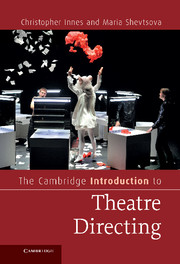Book contents
- Frontmatter
- Contents
- List of illustrations
- Acknowledgements
- Introduction
- Chapter 1 Traditional staging and the evolution of the director
- Chapter 2 The rise of the modern director
- Chapter 3 Directors of theatricality
- Chapter 4 Epic theatre directors
- Chapter 5 Total theatre: the director as auteur
- Chapter 6 Directors of ensemble theatre
- Chapter 7 Directors, collaboration and improvisation
- Notes
- Select bibliography
- Index
- References
Chapter 7 - Directors, collaboration and improvisation
Published online by Cambridge University Press: 05 April 2013
- Frontmatter
- Contents
- List of illustrations
- Acknowledgements
- Introduction
- Chapter 1 Traditional staging and the evolution of the director
- Chapter 2 The rise of the modern director
- Chapter 3 Directors of theatricality
- Chapter 4 Epic theatre directors
- Chapter 5 Total theatre: the director as auteur
- Chapter 6 Directors of ensemble theatre
- Chapter 7 Directors, collaboration and improvisation
- Notes
- Select bibliography
- Index
- References
Summary
Improvisation or devising, as a collective process, raises questions about the nature of directing, its limits and responsibilities. The staging of theatre is always to some degree a group activity. Even where a director is an auteur, like Gordon Craig and Robert Wilson, or the sole performer, as with Robert Lepage’s monodramas, there are technical or dramaturgical staff who contribute to the final shape of a production. However, in an ensemble style of theatre, where it is the performers as a group who evolve the material, develop their own styles of presentation and/or structure the production, the role of the director changes. In such a context, to what extxt, to what extent does a director control or guide the process? What is the director’s function? As we shall see, there is a wide range of possible variations within the frame of improvisational theatre. Improvisation is closely related to physical theatre, and, at its extreme in Paratheatrical projects, claims to deny any directorial role. Yet even here in the examples analysed, there is always a director in some form. Any hierarchical structure contains a political position; and in theory, at least, improvisational theatre is a paradigm of democracy in so far as it projects an image of artistic equality.
Signally it is a director with an extremely marked theatrical and performative style, Roberto Ciulli (see above, pp. 143–6), who has defined a theory of improvisation. And, for the form to mirror content, this is expressed not through a manifesto or a book (like Brook’s The Empty Space), but through a series of unstructured conversations with one-time members of his acting troupe.
- Type
- Chapter
- Information
- The Cambridge Introduction to Theatre Directing , pp. 218 - 252Publisher: Cambridge University PressPrint publication year: 2013

